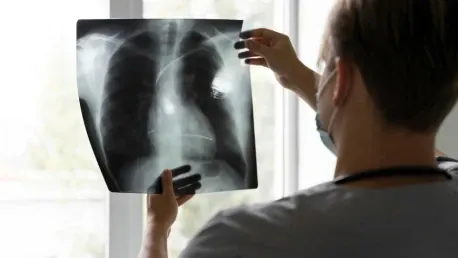In a significant advancement for non-small cell lung cancer (NSCLC) treatment, Akeso and Summit Therapeutics have revealed astounding results from their phase 3 HARMONi-2 trial. Ivonescimab, a PD-1/VEGF bispecific antibody, has demonstrated remarkable efficacy against Merck’s Keytruda, positioning itself as a potential new standard of care in this challenging medical field.
Impressive Efficacy Against Keytruda
Ivonescimab’s standout feature is its impressive ability to reduce the risk of disease progression or death by 49% compared to Keytruda. This achievement was noted among Chinese patients with previously untreated, PD-L1-positive NSCLC. The trial results showed that ivonescimab extended the median progression-free survival (PFS) by more than five months compared to Keytruda, a substantial improvement in the fight against NSCLC.
Broad Efficacy Across Diverse Patient Groups
The superior efficacy of ivonescimab was consistent across various patient subgroups. This includes patients with different tumor types, such as squamous and nonsquamous, and those with both high and low PD-L1 levels. Additionally, the antibody was effective in patients with particular conditions like brain metastases and a history of smoking. Despite these impressive efficacy results, ivonescimab did not result in significant side effects. Though higher rates of VEGF-related adverse events like proteinuria and hypertension were recorded, they were manageable and did not exceed grade 3 severity.
A Safer Treatment Option
One of the key reasons behind ivonescimab’s improved safety profile, especially in preventing severe hemorrhagic events, lies in its design. The PD-1 component helps anchor the antibody to the tumor, reducing systemic exposure that can cause adverse events. Akeso’s Tetrabody technology, which provides four antigen-binding sites, also supports this targeted approach, ensuring effectiveness without escalating risks.
Future Trials and Global Implications
Looking ahead, ivonescimab is set to undergo further trials to confirm these findings on a global level, as the HARMONi-2 trial was solely conducted in China. Summit Therapeutics plans to launch the global phase 3 HARMONi-7 trial, which will directly compare ivonescimab with Keytruda in first-line PD-L1-high NSCLC. Additionally, Summit is preparing for the HARMONi-3 trial, which aims to assess ivonescimab in combination with chemotherapy against Keytruda and chemotherapy in first-line squamous NSCLC.
Awaiting Overall Survival Data
While ivonescimab has shown excellent PFS results, its effect on overall survival (OS) is still to be fully determined, as these data are maturing. Historical trends suggest that significant improvements in PFS often correlate with OS benefits. However, definitive results are essential to gain FDA approval and wider clinical adoption. Analysts express optimism as the trial design does not allow crossover, which should protect potential OS benefits.
Disrupting the Current Therapeutic Landscape
In a groundbreaking development for the treatment of non-small cell lung cancer (NSCLC), Akeso and Summit Therapeutics have announced stunning results from their phase 3 HARMONi-2 trial. The trial focused on ivonescimab, a novel bispecific antibody that targets both PD-1 and VEGF pathways. The results have been nothing short of remarkable, showing significant efficacy against Merck’s widely-used cancer drug, Keytruda. These findings suggest that ivonescimab could become the new standard of care for patients suffering from this aggressive type of lung cancer.
Non-small cell lung cancer is known for being particularly difficult to treat, and the emergence of ivonescimab as a highly effective option brings renewed hope to patients and healthcare providers alike. This new medication operates by targeting two critical pathways involved in tumor growth and immune system evasion, making it a powerful agent against cancer cells. If further validated, ivonescimab could revolutionize the current treatment paradigm, offering a new line of defense against a disease that has traditionally had very limited options.









